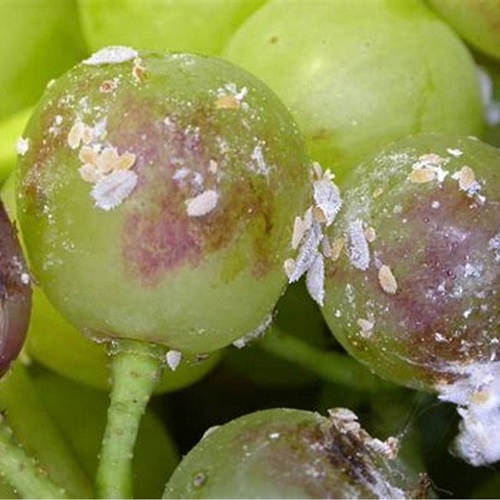Salinas Valley in Northern California is often referred to as the 'Salad Bowl of America'. Home to 'leafy greens', this product mix includes iceberg lettuce, romaine lettuce, green leaf lettuce, red leaf lettuce, butter lettuce, baby leaf lettuce (i.e., immature lettuce or leafy greens), escarole, endive, spring mix, spinach, cabbage, kale, arugula and chard. To name a few.
All too often however, leafy greens are subject to disease and pests. The Platform10 Field Trials for Leafy Greens are seeking to address these diseases;
Impatiens Necrotic Spot Virus (INSV) causes leaves of infected plants to develop brown to dark brown spots and dead (necrotic) areas. In California, INSV is vectored primarily by western flower thrips.
Western flower thrips (WFT), Frankliniella occidentalis, is a damaging pest and virus vector on a variety of crops, including lettuce.
Pythium wilt of lettuce, Pythium uncinulatum, can cause up to 100% yield loss in some fields. Symptoms include stunting, yellowing, and wilting of the outer leaves and eventual plant death.
The Leafy Green Field Trial Process
Grower Trial Implementation
Efficacy Data. Based on the mode of action (feeding deterrent, contact active, induced systemic resistance, mating disruption, etc.) data will be collected on pests and disease incidence, damage ratings, yield, product quality, effects on nontarget organisms including soil microbes** and the ability to avoid using one or more chemical product applications. Results may be published in academic journal (eg. Arthropod Management Tests (AMT) or Plant Disease Management Reports (PDMR)). Protocols will be designed in consultation with the applying company to assess how the product works when incorporated into a more integrated farming system.
**Microbial soil health data. Soil samples may be taken by a third party before and after testing and will be sent to a suitable laboratory to determine effects on the soil microbiome. Metrics typically assessed are microbial diversity and quantity, types of microorganisms (pathogens, nitrogen fixation, carbon sequestration, etc.
What is INSV?
In each crop field trial, we look at one key disease impacting on growers. In this edition, it's INSV.
In 2006, INSV infected lettuce was first reported in Monterey County. For six years, there were minor to severe outbreaks. However, since 2018, Monterey County has seen severe outbreaks along with other coastal regions, seeing up to almost 100% crop loss. In the last year, INSV has been reported in desert lettuce regions in California (Riverside Counties) and in Arizona. When INSV gets into a lettuce plant, it can get spots and lines of dead tissue on its leaves.
When lettuce is infected with INSV, it shows a number of symptoms, such as yellowing leaves, dead spots, and stunted growth. On the inner leaves there are patterns of necrosis and chlorosis. At the base of the ribs of infected lettuce plants there is significant necrosis and lesions. The necrotic tissue can look brown to dark brown. The symptoms can be different depending on how bad the infection is and how far along the plant is in its growth. Extensive necrosis can cause damaged leaves to become dry and dead. If a plant is infected in its early development stages, its growth may be stunted. The virus can also hurt the quality and yield of lettuce crops.
The Platform10 Field Trial program has identified INSV as a key disease to address.
The Growers
Platform10 are delighted to be working with outstanding Western Grower members.

Mark Mason
Mark Mason is a veteran of Salinas Valley Farming, having worked in pest control and crop management for decades. “I am a field guy,” says the Huntington Farms manager. During the growing season, he says he spends 99 percent of his time on the job outdoors making sure the crops grow according to plan.
He was among the first to realize the extent of the trouble facing lettuce. The losses that were coming would not register in the coming crop report but they were already visible in the field last year.
“The ‘oh, shit’ moment came at the end of last year with INSV,” he says. “I could see the virus coming into the edge of the lettuce field, and the edge kept getting bigger and bigger.”
He thought he could control the spread by killing bugs that carried the virus, which are known as thrips. So he had his crews spray for thrips. The virus kept spreading, so they sprayed again. Nothing. At that point, he rang up an entomologist. “I can’t control these thrips,” Mason told the insect expert. “We have got a problem here.”

Tony Alameda
Weeds are overwintering havens for a tiny insect called the Western flower thrips, which in turn carries the impatiens necrotic spot virus (INSV) – a plant virus that caused $100 million in lost gross revenue for Salinas Valley growers in 2020.
The agricultural community called it the biggest problem they'd seen in a long, long time.
Since INSV was first observed in the state in 2006, the virus – which poses no threat to people – triggered significant crop losses in 2019, leading up to a catastrophic 2020. As Alameda’s lettuces began to show the telltale “bronzing” of the leaves, efforts to bag up or remove the infected plants had no effect on the virus’ implacable spread.
“Nothing seemed to work,” he recalled, “and you just watch those fields collapse, week after week, until you’re just like, ‘Ugh, there’s nothing here to even harvest.’ It led to a “100% crop failure.
INSV remains a significant threat to growers.
What's Next?
We will be posting updates on the progress of every field trial on this website. Timings will depend on crop cycles and we will only update when meaningful data is available.
If you believe you have a product that can help address the disease challenges identified above, please email platform10@salinas-summit.com
Our field trial programs are ongoing. Platform10 recognizes the importance of emerging science and research and is keen to support biopesticide companies looking to commercialize that science and research and take it to market.











